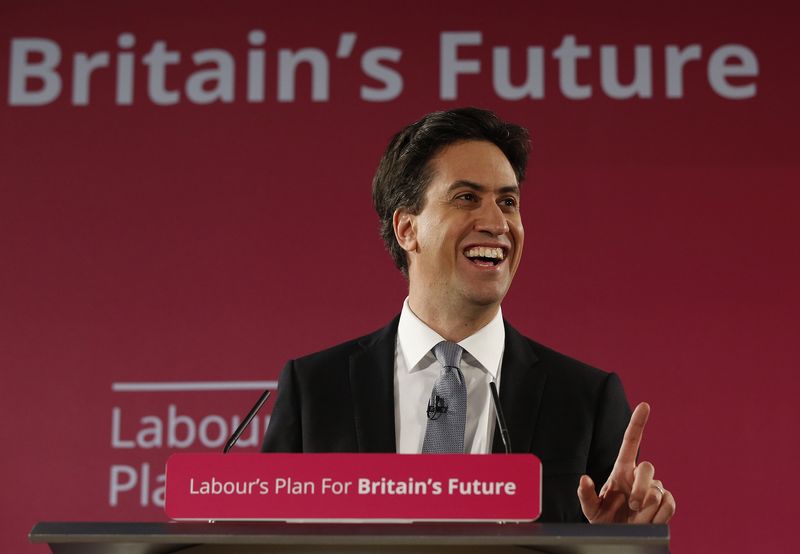By Andrew Osborn
LONDON (Reuters) - Britain's politicians returned on Monday from their Christmas break to launch campaigns for what could be the closest election in memory, with the rise of anti-Europeans and Scottish nationalists creating uncertainty unseen since the 1970s.
Britons who have seen two parties alternate in power for generations could wake to find no fewer than five parties vying for a role in a coalition government after a May 7 election.
The trend that in 2010 saw neither Prime Minister David Cameron's Conservatives nor opposition Labour win an outright majority in parliament for the first time since World War Two has intensified, with polls showing more than a third of voters now spurning the two big parties.
"It's a more complex world," Gus O'Donnell, a British lord and the country's former top civil servant, told Sky News.
"People should be ready for the fact that it might take rather longer to form a government than the five days last time," said O'Donnell, who helped oversee talks in 2010 to form the first coalition since the 1940s, bringing in the centre-left Liberal Democrats in support of Cameron's Conservatives.
Fast forward five years and Cameron's right-leaning Conservatives are divided over Europe, while left-leaning Labour is beset by doubts about the abilities of Ed Miliband, its leader.
Cameron's Liberal Democrat junior partners have the biggest problems. They have seen their support fall by two thirds, with voters disillusioned by the party's role in a centre-right government. Many of their 56 seats in the House of Commons may be up for grabs.
Meanwhile, 2014 saw the populist anti-EU UK Independence Party (UKIP) surge into first in elections for the European parliament in Britain and win its first two seats in the British parliament when Conservatives defected. Its rise mainly hurts Cameron, though UKIP also courts working class Labour voters worried about immigration.
And the Scottish Nationalist Party (SNP), despite losing a referendum on independence, is on course to win dozens of Scottish seats once thought safe for Labour. That clearly hurts Miliband.
The plights of both main leaders means that whoever wins might need the support of two other parties to form a government, and the arrangement could prove so fragile that Britain might need to hold another election in short order.
Some pundits say Britain could even suffer turbulence similar to the 1970s when power changed hands three times via four national elections and four prime ministers.
THE ECONOMY, HEALTHCARE
Cameron wants to fight the election on his economic record.
On his watch, Britain's $2.8 trillion economy has emerged from its deepest downturn since World War Two to enjoy one of the fastest growth rates of any major advanced economy.
While inflation has outpaced wages for much of his five-year term in office and many voters have struggled with rising food and heating bills, the falling cost of oil has now helped take inflation to a 12-year low.
The Conservatives, also known as Tories, portray Labour, who were in power during the 2007/8 financial crisis, as the party that "crashed the car" and shouldn't be given the keys back.
On Monday, finance minister George Osborne accused Labour of planning to spend billions of pounds more in its first year of office than is sustainable. He cast the election as a choice between "competence and chaos".
"Don't put our recovery at risk," Osborne told a news conference.
Labour's Miliband accused Cameron of presiding over a recovery that favoured the wealthy at the expense of the poor and said his party offered a fairer alternative.
Miliband wants to put the state of Britain's free National Health Service (NHS) at the heart of the election campaign, an institution which Britons regard as one of their crown jewels.
"This is nothing less than a once in a generation fight about who our country works for," said Miliband. "It is a choice between a Tory plan where only a few at the top can succeed and our public services are threatened. Or a Labour plan that puts working people first, deals with the deficit and protects our NHS."
Nick Clegg, the Liberal Democrat leader, criticised both Labour and the Conservatives, saying only his party could anchor a future coalition in the centre-ground and stop it lurching either to the right or the left.
Britain's future in the European Union could also be at stake. Cameron is promising to renegotiate Britain's EU ties and hold an in/out membership referendum by 2017 if re-elected. And if Britons vote to leave, nationalists in Scotland have made clear they'd be likely to push for a second referendum on independence from the United Kingdom.
The first opinion poll of 2015 showed the parties broadly stuck where they have been for months. The poll, by Opinium for the Observer newspaper, had Labour barely ahead on 33 percent, the Conservatives on 32 percent, UKIP on 17 percent and the Liberal Democrats on 8 percent.
Unlike most European countries with proportional representation, Britain's first-past-the-post system, in which lawmakers win seats in individual constituencies, makes the outcome tricky to predict even when polls look stable.
Will UKIP's rise damage Cameron? Or will its right-leaning supporters back Conservative candidates to keep out Labour? Who will benefit most when the sagging Liberal Democrats lose seats? After the votes are counted, what demands will smaller parties make to support a coalition?

"It may be a rather more complicated situation: an agreement with two parties and a side deal with SNP on a case by case basis," said O'Donnell. "When I look back on (2010) I think I had it easy."
(Additional reporting by William James and Kylie MacLellan; Editing by Guy Faulconbridge and Peter Graff)